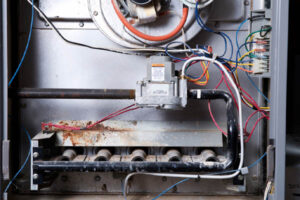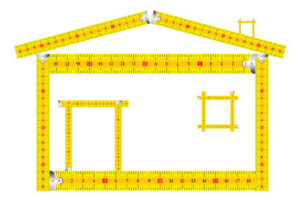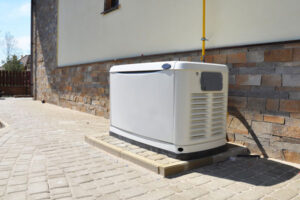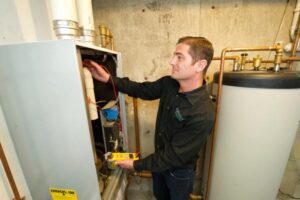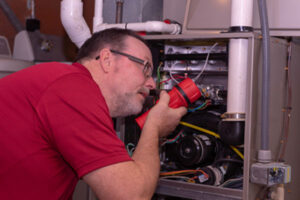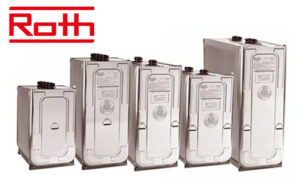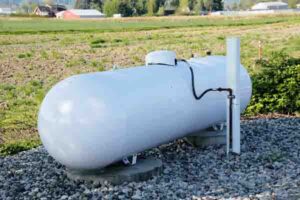Boiler vs. Furnace: A Homeowner’s Guide

Contents
- 1 Key Distinctions Between Boiler Heating Systems & Forced-Air Furnaces
- 2 Boiler vs. Furnace: Comparing Energy Efficiency
- 3 Furnaces & Boilers FAQs
- 3.1 How Often Should I Service My Furnace or Boiler?
- 3.2 What Are the Signs That My Boiler Needs Repair?
- 3.3 Can I Increase the Efficiency of My Existing Furnace or Boiler?
- 3.4 What Should I Consider When Choosing a New Furnace or Boiler?
- 3.5 Are There Any Safety Concerns With Furnaces and Boilers I Should Be Aware Of?
- 4 Conclusion
- 5 Contact Columbus Energies for Comprehensive HVAC Services
Many homeowners mistakenly equate boilers with furnaces, a common misunderstanding given that both systems are designed to heat homes and buildings. Beyond this shared function, the similarities largely dissipate. Each system offers distinct benefits and operates differently, so choosing between a boiler vs. furnace depends on specific heating needs and the existing infrastructure. It’s essential to grasp these differences and the unique advantages of each system to make an informed decision.
Key Distinctions Between Boiler Heating Systems & Forced-Air Furnaces
This article from Columbus Energies delves into the fundamental differences between these two popular heating solutions.
Understanding Boilers
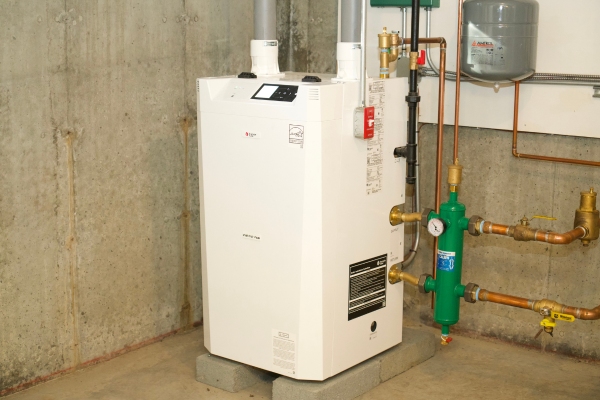
A boiler is a substantial, sealed vessel where water or another liquid is heated to produce steam or vapor. This apparatus is a crucial part of most heating systems, playing a significant role in heat generation and distribution.
Boilers facilitate what is known as hydronic heating or radiator systems. Besides the boiler, this system incorporates baseboards, radiators, pipes, and a circulator pump. These components are strategically placed throughout various rooms to ensure even heat distribution. The complexity of a residential boiler system can vary, typically scaling with the number of rooms in a home.
Exploring Furnaces
A furnace is a heating system that utilizes air as its medium for heat transfer. Often referred to as a “forced-air heating system,” it operates by pushing cool or ambient air through a heat exchanger to warm it. The heated air is circulated throughout various rooms via an HVAC ductwork system. Furnaces can be classified into three styles: horizontal, upflow, and downflow, and they may employ multiple energy sources, including oil, electricity, gas, or induction heating.
Trust Columbus Energies for All Your Heating Solutions. Whether you need installation services or repairs, Columbus Energies ensures your heating system operates flawlessly. Contact us today to learn more!
Contrasting Boilers & Furnaces
The fundamental distinction between a boiler and a furnace lies in their operational methods. A boiler heats water within a tank or container to generate warmth. This hot water or steam is then circulated through a network of pipes throughout the house or building. As the hot water flows through these pipes, they radiate heat that warms the surrounding rooms. As long as the boiler continues to produce hot water or steam, it can effectively maintain the building’s warmth.
In contrast, a furnace heating system employs a heat exchanger to warm air instead of fluids or water. A blower motor propels this heated air throughout the home, driving the warm air through vents and ductwork to distribute heat effectively.
Boiler vs. Furnace: Comparing Energy Efficiency
Heating water is inherently more energy-efficient than heating air. Therefore, furnaces tend to use more fuel over shorter periods than boilers. While boilers generally have a higher initial cost, they may offer more excellent durability and longer service life, assuming they are properly maintained.
Boiler: Advantages & Disadvantages

We’ll now explore the benefits and drawbacks of using a boiler system.
PROS
- Boiler Energy Efficiency: Typically, boilers consume less fuel than furnaces to produce the same heat, leading to lower energy costs.
- Quiet Boiler Operation: Since boilers heat water rather than air, they don’t require fans to push air through the system, making them significantly quieter.
- Consistent Heat: The heat from hot water or steam is more uniform than the fluctuating temperatures from heated air.
- Improved Air Quality: Unlike furnaces, boilers do not circulate air, so they do not spread dust, pollen, or other airborne particulates throughout your home.
CONS
- Limited to Heating: While boilers effectively heat your home, they do not offer cooling capabilities. Unlike furnaces, which share ductwork with central air systems, boilers require a separate cooling system.
- Complex Boiler Installation: Setting up a boiler system is typically more labor-intensive and time-consuming than installing a furnace.
- Slow Response to Temperature Changes: Boilers may need to adjust to changes in thermostat settings faster, leading to delays in achieving desired temperatures.
- Risk of Boiler Leaks: There is a heightened risk of leaks with older or poorly maintained boilers, which can lead to significant water damage.
- Challenging Conversion: Switching from a boiler to a furnace system involves considerable expense and effort, primarily because an entirely new ductwork system must be installed.
Boost Your Heating Efficiency with Columbus Energies. Elevate the heating performance of your home with Columbus Energies. Contact us today to explore our advanced, energy-efficient heating options!
Furnace: Advantages & Disadvantages

Let’s examine the pros and cons linked with using a furnace for home heating.
PROS
- Versatile Fuel Options: Furnaces can operate on various fuels, including electricity, natural gas, heating oil, and propane. While less common, some models are even compatible with solar or geothermal energy.
- Quick Heating: Furnaces can generate heat more rapidly than boilers, enabling them to warm a home quickly.
- Cost-Effectiveness: Due to their prevalence, furnaces are available in many models and units, enhancing competition and lowering costs.
- Reduced Leak Risks: If a furnace leaks, it releases air—not water or other fluids—minimizing the potential for damage to the home.
- No Risk of Freezing: In cold climates, furnaces eliminate the risk of burst pipes due to freezing, a concern with boiler systems that use water for heating.
CONS
- Furnace Noise Production: Furnaces typically generate noise due to the blowers circulating air throughout the home. This sound is noticeable each time the furnace activates.
- Inconsistent Heating: The heat provided by furnaces can be uneven, leading to variations in room temperatures. This inconsistency occurs because air does not retain heat as effectively as water or steam.
- Dependence on Air Quality Maintenance: Indoor air quality can deteriorate if the furnace’s air filters are not regularly cleaned or replaced.
Experience Cozy Comfort with Columbus Energies. Don’t let the chill get to you. Contact Columbus Energies for professional heating solutions and services.
Furnaces & Boilers FAQs

Here are some commonly asked questions about furnaces and boilers to help you understand these heating systems better.
How Often Should I Service My Furnace or Boiler?
It is advisable to have your furnace or boiler serviced once a year, preferably before the onset of the heating season. Routine maintenance promotes efficient performance, extends the unit’s lifespan, and helps avoid sudden malfunctions.
What Are the Signs That My Boiler Needs Repair?
If your boiler needs attention, you might notice several indicators, such as strange noises (banging, whistling, or gurgling), water leaks surrounding the unit, reduced heating efficiency, or fluctuating water temperatures.
Can I Increase the Efficiency of My Existing Furnace or Boiler?
Absolutely! Regular maintenance, improving your home’s insulation, sealing leaks in ductwork or pipes, and using a programmable thermostat to manage your heating settings more effectively can boost your furnace or boiler’s efficiency.
Boost Your Heating Efficiency with Columbus Energies! Optimize your home’s heating with Columbus Energies. Contact us today to discover our range of energy-efficient heating solutions!
What Should I Consider When Choosing a New Furnace or Boiler?
When selecting a new furnace or boiler, take into account the fuel type, the unit’s energy efficiency (opt for high AFUE ratings for furnaces and either high AFUE or thermal efficiency ratings for boilers), the size that best fits your home, and any available rebates or incentives for energy-efficient models.
Are There Any Safety Concerns With Furnaces and Boilers I Should Be Aware Of?
Safety is absolutely crucial when handling boilers and furnaces. Make sure they are installed and regularly inspected by certified professionals. Be vigilant about the risk of carbon monoxide poisoning by installing detectors near these units. Additionally, ensure that safety valves and emergency shut-offs work correctly to mitigate potential hazards.
Conclusion
Deciding between boiler vs. furnace will primarily hinge on your specific heating and cooling requirements and the layout of your property. When upgrading from an older system, it’s reassuring to note that modern boilers and furnaces are designed with high-efficiency ratings, ensuring long-term savings. If you still need to decide the best option for your needs, consulting with a local HVAC professional can provide expert guidance.
Prepare for Winter with Columbus Energies. Make sure your home stays warm and inviting this winter. Reach out to Columbus Energies today for top-notch heating services!
Contact Columbus Energies for Comprehensive HVAC Services
Columbus Energies provides top-tier heating and cooling solutions across Southeastern Massachusetts and the Rhode Island region. Our professionally certified technicians are equipped to handle everything from routine HVAC maintenance to complex repairs, installations, and system replacements. Each technician brings experience and expertise to ensure your HVAC system is serviced efficiently.
We proudly offer the most competitively priced heating and cooling services in the region. Our tune-up services are made to enhance your comfort and increase energy efficiency, helping lower your heating and cooling expenses. If you require HVAC repair or are considering a new system, we can guide you to the solutions that best suit your needs and budget. We stand behind our work with a robust satisfaction guarantee. Contact Columbus Energies today to arrange a service visit and receive a free in-home estimate.
Contact us now by calling (508) 674-1492 to speak to one of our home comfort specialists! Click the link to view our HVAC service area.

Related Articles:
